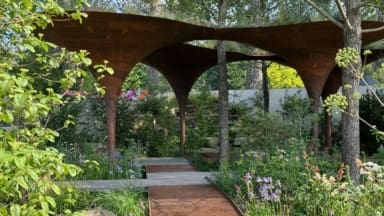
According to Creepers Nursery, the results of their survey, conducted amongst 50 garden designers at the recent SGD Spring Conference, show a collective move towards more environmentally conscious and low-maintenance gardens that prioritise ecological benefits and aesthetic values. The survey highlighted that garden designers are deeply invested in the environmental impact and sustainability of their designs.
Garden Design trends revealed in the Creepers Survey:
- Naturalistic and Sustainable Approaches: A significant number of designers are adopting a naturalistic approach, focusing on creating spaces that blend seamlessly with nature rather than competing with it. This includes using native plants, promoting biodiversity, and employing sustainable practices like water retention and low irrigation schemes.
- Drought Resilience and Low Maintenance: With changing climate conditions, there is a noticeable pivot towards drought-tolerant planting. Gardeners are increasingly favouring plants that require less water and maintenance, ensuring that gardens are both beautiful and resilient. This trend is closely tied with the concept of xeriscaping (landscaping that reduces or eliminates the need for irrigation) and the use of dry gardens and gravel gardens.
- Reclaimed and Local Materials: In line with the circular economy, there is a growing preference for using reclaimed materials and sourcing plants locally. This not only reduces the carbon footprint associated with transporting materials but also supports local ecosystems and economies.
- Focus on Soil Health and Biodiversity: Soil health is a cornerstone of sustainable gardening, with many designers emphasising the importance of nurturing soil to support diverse planting. This approach supports more robust plant growth and a healthier garden ecosystem overall.
- Designs Tailored to Client Needs and Site Specifics: While the trend is decidedly green and naturalistic, designers also stress the importance of customising gardens to fit the specific needs and preferences of clients. This includes integrating elements like outdoor kitchens, urban courtyards, and even spaces designed for wildlife.
- Innovative Use of Space and Plants: From edibles mixed into ornamental gardens to bold, structured plantings that feature a mix of shrubs and perennials, designers are getting creative with how they use both plants and garden spaces. There is also a noticeable trend towards creating rain gardens and incorporating elements that attract and support local wildlife.
- Aesthetic and Functional Blends: The survey revealed a blend of traditional and contemporary styles, with a push towards modern designs that do not forsake the classic beauty of garden landscapes. This includes integrating modern elements like crushed materials for pathways with traditional cottage-style planting or Mediterranean-inspired designs.
Creepers Nursery is a specialist wholesale nursery with locations in Surrey, South London and Hampshire, supplying the UK trade with plants, shrubs, trees and topiary.

